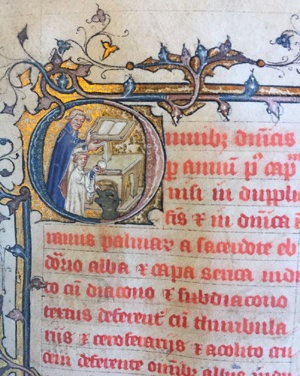
Seminar: “In veneratione nominis dilecti: William Beauchamp, His Missal, and Devotion to the Holy Name of Jesus”
Benjamin Barootes (Mellon Fellow, PIMS)
The manuscript now catalogued as Oxford, Trinity College 8 is a late fourteenth-century luxury missal that was made for Sir William Beauchamp, first Baron Bergavenny (c. 1343-1411). Among its many surprising features, the missal is best-known to scholars for containing the earliest surviving exemplar of the Mass for the Holy Name of Jesus. English devotion to the Holy Name, distinct from continental cults, increased dramatically in the later fourteenth century, and throughout the fifteenth century Jesus guilds and fraternities proliferated throughout the kingdom. The cult was popular at all levels of society, from townspeople to gentry and nobles—even the royal families: Lady Margaret Beaufort, mother to King Henry VII, was the foremost proponent of the Name of Jesus and worked to get the feast established in the late 1480s.
This seminar paper will offer a brief history of devotion to the Holy Name, tracing it from biblical texts and patristic commentary through high-medieval monastic writing and the Christocentric turn of the thirteenth century; the historical survey concludes with the decades preceding the production of the Trinity 8 missal by focussing on the Holy Name devotion of the English mystic Richard Rolle. I then turn to the Beauchamp missal to examine how Sir William’s personal piety was reflected in his mass book. While previous scholars have taken the Trinity 8 manuscript to be identical to other exemplars of the Jesus mass, I show that close inspection of the folia reveals this is not the case: the mass in Beauchamp’s missal is markedly different and thus forces us to reconfigure our understanding of how the devotion developed in England in the Late Middle Ages.


